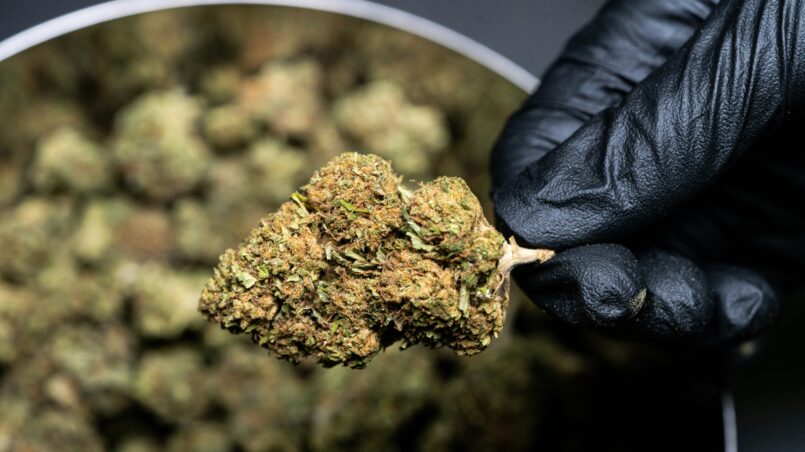What is THCA?
THCA is a leader in THC, found in raw and freshly collected cannabis plants. Unlike THC, THCA is non-intoxicating, suggesting it does not generate the “high” typically associated with marijuana consumption. When subjected to warm with a treatment called decarboxylation– typically attained with cigarette smoking, vaping, or cooking– thca flowers exchanges THC, the psychedelic material acknowledged for its blissful results.
The Power of THCA Flowers
While THC controls a lot of the discourse bordering cannabis, THCA has been acquiring recognition for its potential healing buildings. The study recommends that THCA may provide a selection of wellness and health benefits without the psychoactive effects of THC. Some possible advantages of THCA consist of the following:
1. Anti-inflammatory Characteristics:
THCA has encouraging anti-inflammatory properties, making it beneficial for treating conditions such as joint inflammation, inflammatory gastrointestinal tract condition (IBD), and numerous other inflammatory conditions. By decreasing swelling, THCA might alleviate discomfort and boost total health.
2. Neuroprotective Influences:
Study research suggests that THCA might have neuroprotective properties, with potential advantages for neurodegenerative troubles like Alzheimer’s disease and Parkinson’s disease. By securing neurons from damage, THCA reveals promise as a healing remedy for maintaining mind health.
3. Antiemetic Qualities:
THCA has been revealed as an antiemetic, implying it may aid in minimizing nausea and throwing up. This makes it specifically crucial for people carrying out chemotherapy or experiencing nausea or vomiting about other medical issues.
4. Antioxidant Benefits:
Like other cannabinoids, THCA has antioxidant residential properties, which aid in fighting oxidative stress and cellular damage set off by free-of-charge radicals. Anti-oxidants are necessary for maintaining basic wellness and decreasing the danger of relentless illness.
Consumption and Accessibility
THCA-rich products, such as THCA blooms, significances, and casts, are becoming dramatically readily available in legal marijuana markets. THCA flowers are gathered and refined to secure the cannabinoid in its raw kind, guaranteeing customers can value its potential benefits without the psychoactive results of THC
Intake techniques for THCA flowers differ, with alternatives consisting of cigarette smoking, vaping, or integrating them right into edibles and drinks. Some customers might eat THCA in its raw type by including it in salads or drinks to optimize its possible health benefits.
Understanding THCA and THC
THCA and THC are both cannabinoids, chemical compounds situated in the marijuana plant. Nevertheless, they have distinctive buildings and influences due to their varying chemical frameworks and communications with the endocannabinoid system (ECS).
THCA (tetrahydrocannabinolic acid) is the acidic forerunner to THC. In raw cannabis flowers, THCA is the leading cannabinoid, generally comprising approximately 90% of the total cannabinoid web content. Unlike THC, THCA is non-intoxicating, meaning it does not generate the psychedelic results normally gotten in touch with marijuana consumption. Instead, THCA is prized for its possible recovery advantages, consisting of anti-inflammatory, neuroprotective, and antiemetic residential or commercial properties.
When marijuana is warmed with procedures such as smoking, vaping, or food preparation (decarboxylation), THCA undergoes a chemical change, dropping a carboxyl group and trading THC. This decarboxylation procedure is critical for switching on the psychedelic residential properties of marijuana. For that reason, heated marijuana products, such as smoked flowers, edibles, and concentrates, consist primarily of THC as opposed to THCA.
Differences in Chemical Structure
The chemical framework of THCA and THC varies largely in their molecular framework. THCA consists of a carboxyl group (COOH) affixed to the particle, which is missing in THC. This carboxyl team supervises THC’s acidic nature and contributes to its unique homes, including its failure to bind straight to cannabinoid receptors in the ECS.
THCA’s carboxyl team makes it water-soluble and much less quickly taken in by the body than THC. As a result, eating raw cannabis or THCA-rich items commonly results in limited psychoactive impacts, if any type of. On the other hand, THC conveniently crosses the blood-brain challenge, binding to cannabinoid receptors in the brain and main nerves, for that reason, causing the particular happiness and transformed perception related to cannabis drunkenness.
Taking A Look At THCA Flowers and Mental Wellness And Health
Beyond anxiety and anxiousness administration, THCA flowers are collecting interest for their feasible impact on various mental health problems. While much more extensive scientific trials are necessitated, unscientific evidence suggests that individuals with anxiety and anxiety, anxiousness, PTSD, and other state-of-mind disorders have reported desirable arise from integrating THCA-rich cannabis into their health regimens.
Furthermore, THCA’s purported neuroprotective properties raise fascinating chances for conditions like neurodegenerative diseases and cognitive decline related to aging. While its efficiency remains speculative, recurring research studies assure clarity of THC’s function in psychological and neurological wellness.
Factors to consider for Usage
Before consisting THCA flowers in your anxiety administration or psychological health and wellness routine, it’s vital to think about many elements:
Authenticity and Availability: The legality of marijuana and its by-products differs by territory. Ensure to comply with regional regulations and regulations before getting THCA flowers.
Quality and Purity: Look for credible sources that stay with rigorous quality assurance steps. Organic growing and third-party screening for performance and pollutants are critical for ensuring item safety and efficiency.
Dose and Administration: With reduced dosages, gradually titrate upwards to evaluate private reaction and resistance. The factors to take into consideration in management strategies, such as inhalation, intake, or topical application, are crucial in maximizing therapeutic outcomes.
Holistic Method: While THCA flowers may provide adjunctive benefits, they need not change standard treatments or all-natural strategies for anxiety administration and emotional health. Mindfulness, exercise, nourishment, and treatment synergistically enhance total well-being.
Verdict
As the interest rate in marijuana continues to expand, so too does our understanding of its complicated chemistry and healing capability. THCA flowers represent an interesting facet of marijuana expansion and use, providing special health and wellness benefits past those related to THC alone.
While much more study is needed to recognize the devices and results of THCA completely, very early searchings recommend that this cannabinoid holds a pledge as a healing representative for many health issues. Whether used medicinally or recreationally, THCA flowers offer an alternating choice for marijuana consumers looking for the possible benefits of cannabinoids without the psychoactive effects of THC.
As legalization initiatives develop and clinical study expands, the duty of THCA in the cannabis landscape is most likely to end up being a lot more popular. By discovering the power of THCA flowers and approving the variety of cannabinoids, we open up new chances for wellness and discovery worldwide of marijuana.

